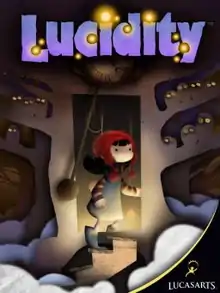Lucidity (video game)
Lucidity is a side-scrolling puzzle-platform game developed and published by LucasArts for the Microsoft Windows and Xbox Live Arcade.
| Lucidity | |
|---|---|
 Lucidity promotional artwork | |
| Developer(s) | LucasArts |
| Publisher(s) | LucasArts |
| Writer(s) | David Nottingham Joe Ching Andrea Rhodes |
| Engine | XNA |
| Platform(s) | Microsoft Windows, Xbox 360 |
| Release | October 7, 2009 |
| Genre(s) | Puzzle-platformer |
| Mode(s) | Single-player |
Overview
The game involves helping Sofi, a little girl wandering through her dreams in search of her Nana, who has disappeared from her life. Sofi walks innocently across the screen, to the end of each level. Instead of controlling her directly, players control a cursor and use objects such as stairs, trampolines and slingshots to get her across platforms and protect her from enemies. Similar to Tetris, these items come randomly, with an icon in the corner showing which object will come next. Players can "hold" one item for use later on, but they cannot discard items. Within the level there are fireflies that can restore Sofi's health if she is hit by enemies, and which unlock bonus levels if collected in great numbers. If Sofi falls into hazards such as thorns, the player has to restart the level.
Development
The initial prototype for Lucidity was built during an event called "Dream Week" at LucasArts in 2009, where teams of employees had a week to build a game that they wanted to make.[1] The prototype did not win a prize at the end of the event, but it was the only Dream Week game that turned into a published game.[2] A different team built the published game, with one of the original team members, Chip Sbrogna.[1]
The team that built the published game also worked on the 2009 remake of The Secret of Monkey Island. LucasArts said these games were part of an "effort at LucasArts to form several small internal development teams and give them the creative freedom to make games that surprise, amaze and inspire", after several years of mostly making licensed games.[3]
Reception
| Aggregator | Score | |
|---|---|---|
| PC | Xbox 360 | |
| Metacritic | 59/100[4] | 63/100[5] |
| Publication | Score | |
|---|---|---|
| PC | Xbox 360 | |
| Destructoid | N/A | 4.5/10[6] |
| Edge | 7/10[7] | 7/10[7] |
| Eurogamer | 8/10[8] | 8/10[8] |
| Game Informer | N/A | 7/10[9] |
| GamePro | ||
| GameSpot | 5.5/10[11] | 5.5/10[11] |
| Giant Bomb | N/A | |
| IGN | N/A | 6.3/10[13] |
| Official Xbox Magazine (US) | N/A | 8/10[14] |
| PC Gamer (UK) | 45%[15] | N/A |
| The A.V. Club | N/A | C+[16] |
| Teletext GameCentral | N/A | 5/10[17] |
The game received "mixed" reviews on both platforms according to the review aggregation website Metacritic.[4][5]
IGN's Daemon Hatfield said that while the art style of the Xbox 360 version is great, the gameplay isn't engaging enough.[13] Giant Bomb's Vinny Caravella said that while the art design of the same console version is "absolutely exquisite", the gameplay is average, and the random order of the items can get frustrating. Caravella also said that the framing story, of Sofi dealing with the loss of her Nana, tried too hard to be cute and heartwarming, at times being "a little too 'fuzzy mittens' for its own good".[12] Carolyn Petit, a reviewer for GameSpot, stated that the "Difficulty [of the game] can be maddening sometimes." She also noted the inability of the camera to zoom out made navigation difficult. She praised the game's interesting concept, but claimed that "Unfortunately, the gameplay rarely contributes much enjoyment to this experience and often operates at direct odds with it."[11]
The Australian video game talk show Good Game's two reviewers gave the Xbox 360 version 5.5 out of 10 and 6.5 out of 10.[18]
References
- Shara (November 10, 2009). "From dreams come dreams". LucasArts Workshop. Retrieved September 9, 2015.
- Haemmerle, Judith (August 31, 2014). "Preservation – Physical or Digital?". The Digital Game Museum. Retrieved September 9, 2015.
- Remo, Chris (September 11, 2009). "LucasArts Announces PC/XBLA Puzzler Lucidity, Promises New Properties". Gamasutra. UBM plc. Retrieved July 21, 2019.
- "Lucidity for PC Reviews". Metacritic. CBS Interactive. Retrieved July 21, 2019.
- "Lucidity for Xbox 360 Reviews". Metacritic. CBS Interactive. Retrieved July 21, 2019.
- Nicholson, Brad (October 12, 2009). "Review: Lucidity (X360)". Destructoid. Enthusiast Gaming. Retrieved July 22, 2019.
- Edge staff (October 9, 2009). "Review: Lucidity". Edge. Future plc. Archived from the original on October 11, 2009. Retrieved July 21, 2019.
- Donlan, Christian (October 7, 2009). "Lucidity". Eurogamer. Gamer Network. Retrieved July 22, 2019.
- Marchiafava, Jeff (October 8, 2009). "Lucidity (X360): Lucidity's Artistic Dream World Quickly Becomes A Nightmare For Gamers". Game Informer. GameStop. Retrieved July 21, 2019.
- Ely, Sean (October 14, 2009). "PC/XBLA Review: Lucidity". GamePro Arcade. GamePro Media. Archived from the original on April 13, 2011. Retrieved July 22, 2019.
- Petit, Carolyn (October 13, 2009). "Lucidity Review". GameSpot. CBS Interactive. Retrieved July 21, 2019.
- Caravella, Vinny (October 12, 2009). "Lucidity Review (XBGS)". Giant Bomb. CBS Interactive. Retrieved July 21, 2019.
- Hatfield, Daemon (October 6, 2009). "Lucidity Review (X360)". IGN. Ziff Davis. Retrieved July 21, 2019.
- "Lucidity". Official Xbox Magazine. Future US. December 25, 2009. p. 81.
- "Lucidity". PC Gamer UK. Future plc. December 2009. p. 92.
- Jones, Scott (October 12, 2009). "Lucidity (X360)". The A.V. Club. The Onion. Archived from the original on October 15, 2009. Retrieved July 22, 2019.
- Hargreaves, Roger (October 2009). "Lucidity (360)". Teletext GameCentral. Teletext Ltd. Archived from the original on October 10, 2009. Retrieved July 22, 2019.
- Jung; Bajo (October 19, 2009). "Lucidity". Good Game. Australian Broadcasting Corporation.